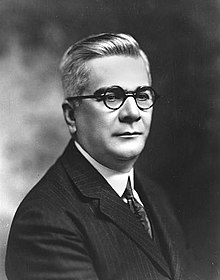Gerardo Machado
Gerardo Machado y Morales (born November 28, 1871 in Santa Clara , Cuba , † March 29, 1939 in Miami , USA ), Cuban politician and dictator , was the fifth President of the Republic of Cuba from 1925 to 1933.
Life
Machado was the son of an immigrant from the island of La Palma ( Canary Islands ) and came from modest economic circumstances. Before starting his military career, he worked as a butcher in Santa Clara. He took part in the Cuban War of Independence against the Spanish colonial power ( Guerra de Independencia 1895–1898) and most recently had the rank of general.
After the War of Independence, Machado became a businessman and ran General Electric's Cuba branch . In 1924 he was chosen as the presidential candidate of the Liberal Party ( Partido Liberal de Cuba ). He was the designated successor to Alfredo Zayas .
He was elected President on May 20, 1925 . Machado, who was able to rely on broad political support at the beginning, gradually disempowered the political institutions that restricted his power and established an authoritarian sole government based on the military. From Mexico Machado took over the once of Porfirio Díaz introduced Ley de Fuga , which allowed extrajudicial executions. The Porristas' secret police terrorized the population.
Machado represented in particular the interests of the large sugar plantation owners and the US electrical industry ( ITT , General Electric etc.), which had supported his election campaign with one million US dollars . Under his aegis , tourism and its side effects, prostitution and gambling flourished . At the same time, rum producers benefited from prohibition in the USA, because spirits could still be consumed unhindered on the island .
Under Machado's rule, the Carretera Central , the two-lane central road from La Fe in the west via Havana to Santiago de Cuba , the Capitol of Havana and the Presidio Modelo prison on Isla de la Juventud were built. The construction of the Capitol alone cost around 20 million US dollars. Public debt grew correspondingly , accompanied by ubiquitous corruption .
After an election in 1929, of which Machado was the only candidate, there was an ever-increasing resistance movement from 1930 onwards, which initially came from intellectuals and workers, but then also included large parts of the bourgeoisie.
Machado had been a member of a Masonic lodge since the late 1890s . In 1929 he issued a decree which gave the Gran Logia de la Isla de Cuba a state plot of land for the construction of a grand lodge temple. He made the condition that a public library and a lay school be set up in this house. The building's bell tower received a statue of free thought with a fanal burning at night (see also History of Freemasonry in Cuba ).
Machado's policies aroused increasingly fierce opposition in the country, which eventually culminated in the victorious Democratic Revolution of 1933. On August 11, 1933, he had to flee the country by plane. He died in Miami in 1939 .
Web links
- Jules R. Benjamin: The 'Machadato' and Cuban Nationalism, 1928–1932 (PDF; 2.8 MB), accessed on June 23, 2013 (English)
- Newspaper article about Gerardo Machado in the 20th century press kit of the ZBW - Leibniz Information Center for Economics .
Individual evidence
- ↑ a b c d e Leslie Manigat : L'Amérique latine au XXe siècle - 1889–1929 . H146. Éditions du Seuil, Paris 1991, ISBN 978-2-02-012373-0 , pp. 354 ff . (première édition 1973 aux Éditions Richelieu).
- ↑ De Maconnieke Encyclopedie ( page no longer available , search in web archives ) Info: The link was automatically marked as defective. Please check the link according to the instructions and then remove this notice. accessed September 22, 2007
- ↑ Eugen Lennhoff, Oskar Posner, Dieter A. Binder: Internationales Freemaurerlexikon. 5th, revised and expanded new edition. Herbig, Munich 2006, ISBN 3-7766-2478-7 .
| personal data | |
|---|---|
| SURNAME | Machado, Gerardo |
| ALTERNATIVE NAMES | Machado y Morales, Gerardo (full name) |
| BRIEF DESCRIPTION | Cuban President and Dictator |
| DATE OF BIRTH | November 28, 1871 |
| PLACE OF BIRTH | Santa Clara , Cuba |
| DATE OF DEATH | March 29, 1939 |
| Place of death | Miami , USA |


